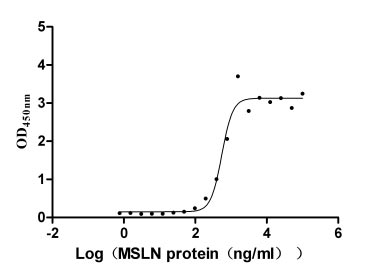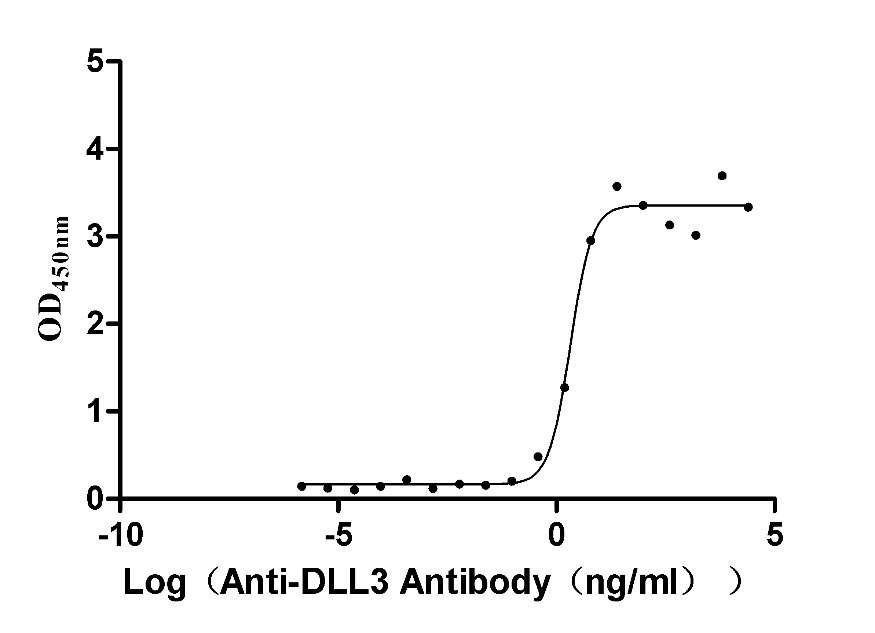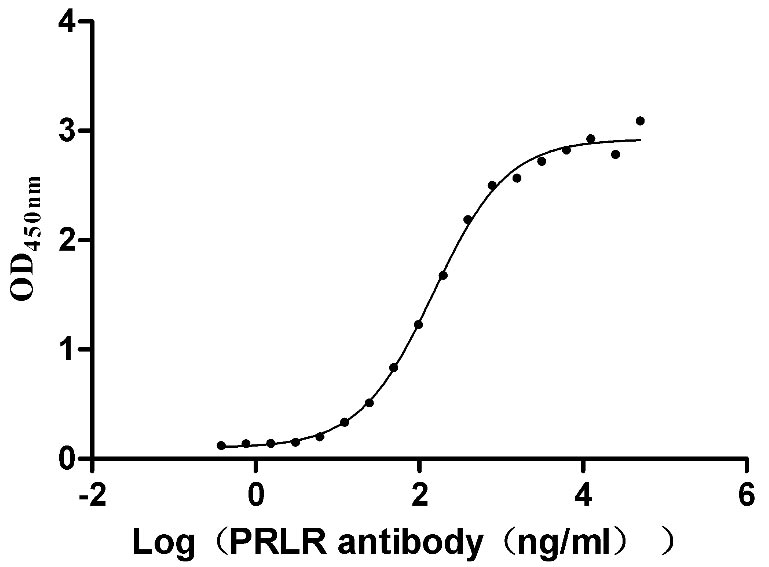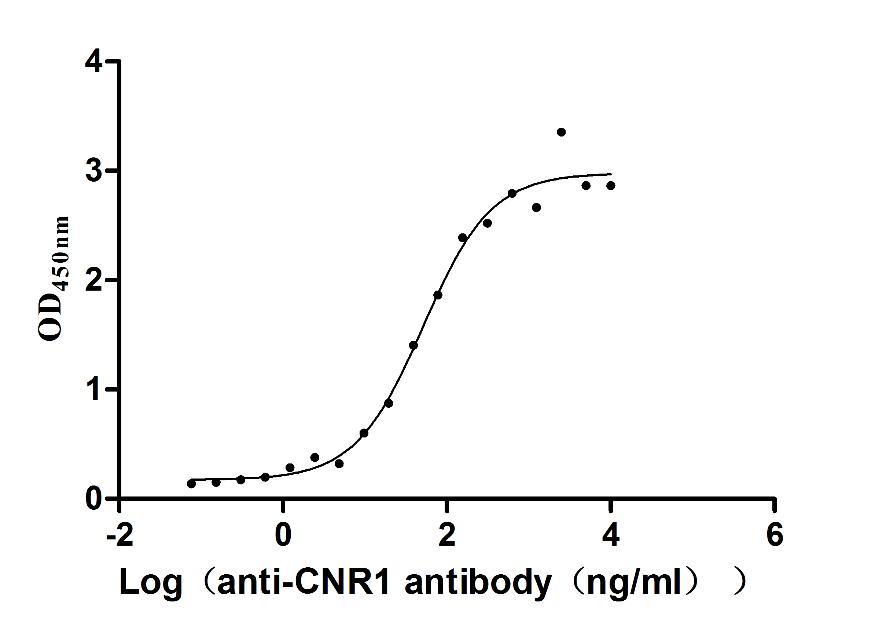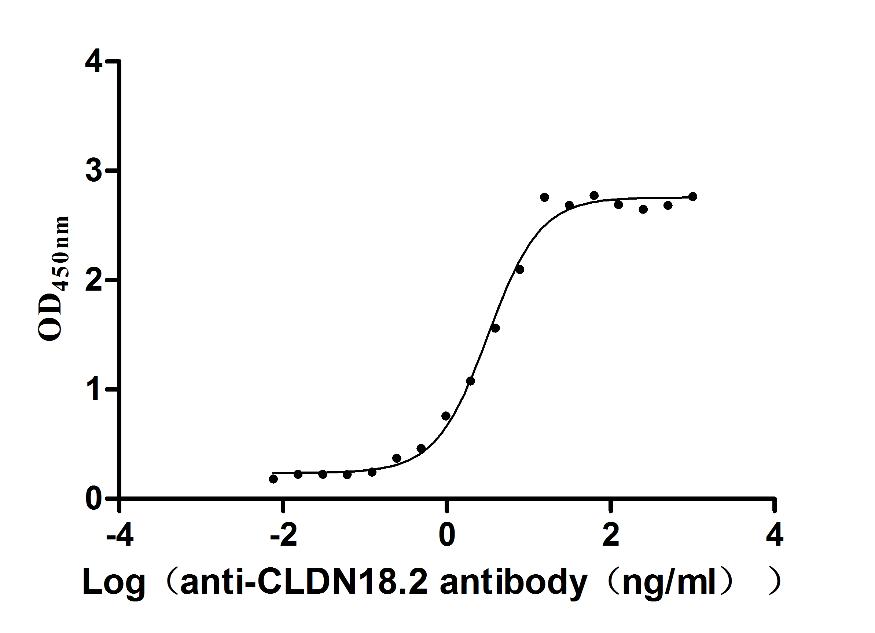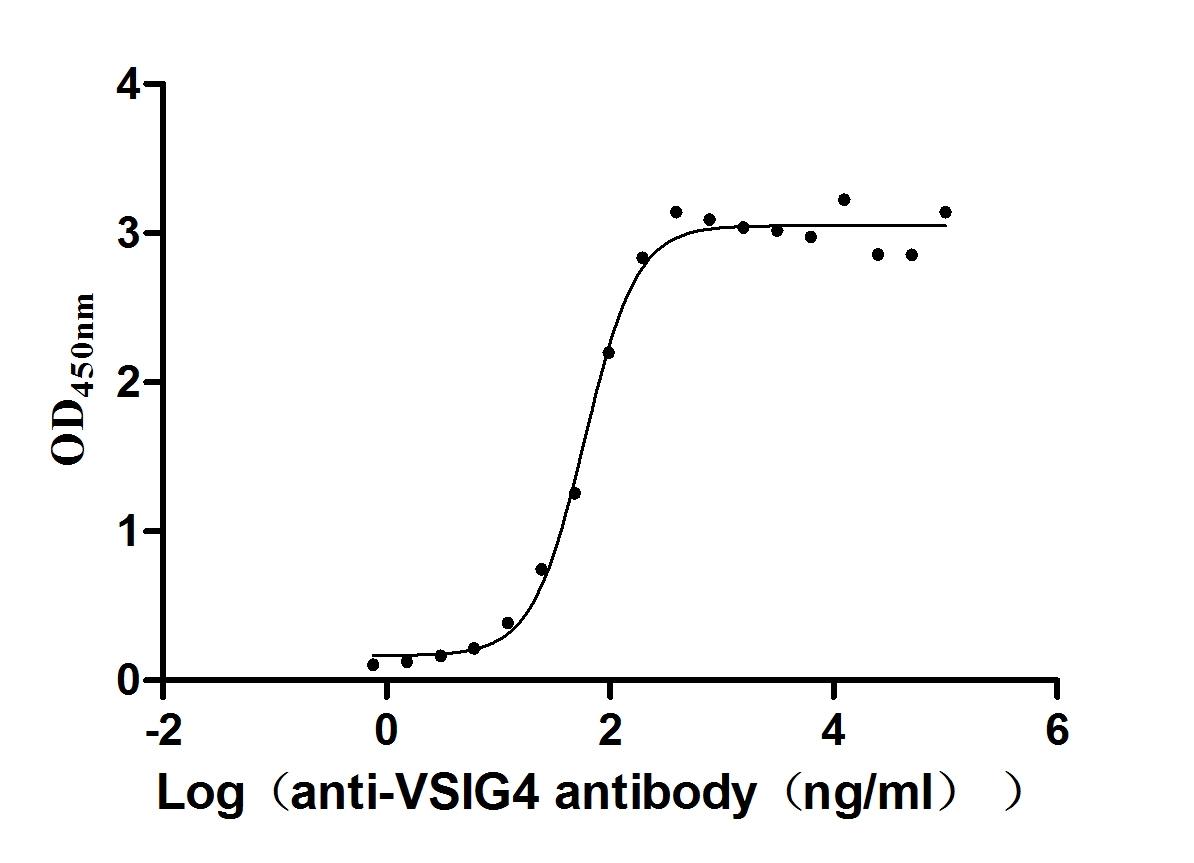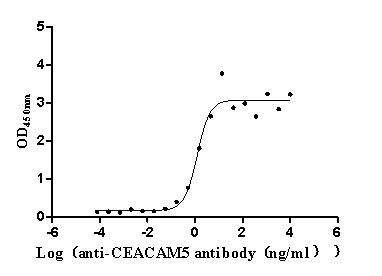Recombinant Human Protein kinase C eta type (PRKCH)
-
中文名称:人PRKCH重组蛋白
-
货号:CSB-YP018706HU
-
规格:
-
来源:Yeast
-
其他:
-
中文名称:人PRKCH重组蛋白
-
货号:CSB-EP018706HU-B
-
规格:
-
来源:E.coli
-
共轭:Avi-tag Biotinylated
E. coli biotin ligase (BirA) is highly specific in covalently attaching biotin to the 15 amino acid AviTag peptide. This recombinant protein was biotinylated in vivo by AviTag-BirA technology, which method is BriA catalyzes amide linkage between the biotin and the specific lysine of the AviTag.
-
其他:
-
中文名称:人PRKCH重组蛋白
-
货号:CSB-BP018706HU
-
规格:
-
来源:Baculovirus
-
其他:
-
中文名称:人PRKCH重组蛋白
-
货号:CSB-MP018706HU
-
规格:
-
来源:Mammalian cell
-
其他:
产品详情
-
纯度:>85% (SDS-PAGE)
-
基因名:
-
Uniprot No.:
-
别名:KPCL_HUMAN; MGC 5363; MGC26269; MGC5363; nPKC eta; nPKC-eta; PKC h; PKC L; PKC-L; PKCh; PKCL; Prkch; PRKCL; Protein kinase C eta; Protein kinase C eta type
-
种属:Homo sapiens (Human)
-
蛋白长度:Full length protein
-
表达区域:1-683
-
氨基酸序列MSSGTMKFNG YLRVRIGEAV GLQPTRWSLR HSLFKKGHQL LDPYLTVSVD QVRVGQTSTK QKTNKPTYNE EFCANVTDGG HLELAVFHET PLGYDHFVAN CTLQFQELLR TTGASDTFEG WVDLEPEGKV FVVITLTGSF TEATLQRDRI FKHFTRKRQR AMRRRVHQIN GHKFMATYLR QPTYCSHCRE FIWGVFGKQG YQCQVCTCVV HKRCHHLIVT ACTCQNNINK VDSKIAEQRF GINIPHKFSI HNYKVPTFCD HCGSLLWGIM RQGLQCKICK MNVHIRCQAN VAPNCGVNAV ELAKTLAGMG LQPGNISPTS KLVSRSTLRR QGKESSKEGN GIGVNSSNRL GIDNFEFIRV LGKGSFGKVM LARVKETGDL YAVKVLKKDV ILQDDDVECT MTEKRILSLA RNHPFLTQLF CCFQTPDRLF FVMEFVNGGD LMFHIQKSRR FDEARARFYA AEIISALMFL HDKGIIYRDL KLDNVLLDHE GHCKLADFGM CKEGICNGVT TATFCGTPDY IAPEILQEML YGPAVDWWAM GVLLYEMLCG HAPFEAENED DLFEAILNDE VVYPTWLHED ATGILKSFMT KNPTMRLGSL TQGGEHAILR HPFFKEIDWA QLNHRQIEPP FRPRIKSRED VSNFDPDFIK EEPVLTPIDE GHLPMINQDE FRNFSYVSPE LQP
-
蛋白标签:Tag type will be determined during the manufacturing process.
The tag type will be determined during production process. If you have specified tag type, please tell us and we will develop the specified tag preferentially. -
产品提供形式:Lyophilized powder
Note: We will preferentially ship the format that we have in stock, however, if you have any special requirement for the format, please remark your requirement when placing the order, we will prepare according to your demand. -
复溶:We recommend that this vial be briefly centrifuged prior to opening to bring the contents to the bottom. Please reconstitute protein in deionized sterile water to a concentration of 0.1-1.0 mg/mL.We recommend to add 5-50% of glycerol (final concentration) and aliquot for long-term storage at -20℃/-80℃. Our default final concentration of glycerol is 50%. Customers could use it as reference.
-
储存条件:Store at -20°C/-80°C upon receipt, aliquoting is necessary for mutiple use. Avoid repeated freeze-thaw cycles.
-
保质期:The shelf life is related to many factors, storage state, buffer ingredients, storage temperature and the stability of the protein itself.
Generally, the shelf life of liquid form is 6 months at -20°C/-80°C. The shelf life of lyophilized form is 12 months at -20°C/-80°C. -
货期:Delivery time may differ from different purchasing way or location, please kindly consult your local distributors for specific delivery time.Note: All of our proteins are default shipped with normal blue ice packs, if you request to ship with dry ice, please communicate with us in advance and extra fees will be charged.
-
注意事项:Repeated freezing and thawing is not recommended. Store working aliquots at 4°C for up to one week.
-
Datasheet :Please contact us to get it.
相关产品
靶点详情
-
功能:Calcium-independent, phospholipid- and diacylglycerol (DAG)-dependent serine/threonine-protein kinase that is involved in the regulation of cell differentiation in keratinocytes and pre-B cell receptor, mediates regulation of epithelial tight junction integrity and foam cell formation, and is required for glioblastoma proliferation and apoptosis prevention in MCF-7 cells. In keratinocytes, binds and activates the tyrosine kinase FYN, which in turn blocks epidermal growth factor receptor (EGFR) signaling and leads to keratinocyte growth arrest and differentiation. Associates with the cyclin CCNE1-CDK2-CDKN1B complex and inhibits CDK2 kinase activity, leading to RB1 dephosphorylation and thereby G1 arrest in keratinocytes. In association with RALA activates actin depolymerization, which is necessary for keratinocyte differentiation. In the pre-B cell receptor signaling, functions downstream of BLNK by up-regulating IRF4, which in turn activates L chain gene rearrangement. Regulates epithelial tight junctions (TJs) by phosphorylating occludin (OCLN) on threonine residues, which is necessary for the assembly and maintenance of TJs. In association with PLD2 and via TLR4 signaling, is involved in lipopolysaccharide (LPS)-induced RGS2 down-regulation and foam cell formation. Upon PMA stimulation, mediates glioblastoma cell proliferation by activating the mTOR pathway, the PI3K/AKT pathway and the ERK1-dependent phosphorylation of ELK1. Involved in the protection of glioblastoma cells from irradiation-induced apoptosis by preventing caspase-9 activation. In camptothecin-treated MCF-7 cells, regulates NF-kappa-B upstream signaling by activating IKBKB, and confers protection against DNA damage-induced apoptosis. Promotes oncogenic functions of ATF2 in the nucleus while blocking its apoptotic function at mitochondria. Phosphorylates ATF2 which promotes its nuclear retention and transcriptional activity and negatively regulates its mitochondrial localization.
-
基因功能参考文献:
- These results suggest that PKCeta utilizes the ERK signaling pathway to protect against ubiquitin-mediated proteasomal degradation of Mcl-1 PMID: 28939105
- PRKCH rs2230500 gene polymorphism is significantly related to the efficiency in telmisartan therapy (p = 0.02). The PRKCH rs2230500 may influence the antihypertensive efficacy of telmisartan in Chinese EH patients. PMID: 28640647
- PRKCH is highly expressed in hematopoietic stem cell (HSC) and is necessary for optimal HSC function. PMID: 28596089
- The association between PRKCH 1425G/A and lacunar infarction was independent of traditional stroke risk factors PMID: 25900926
- variant genotypes of PRKCH 1425G/A are an independent prognostic factor for ischemic stroke in the final multivariate Cox regression model PMID: 25370935
- Meta-analysis indicated that the 1425G/A SNP in PRKCH may contribute to susceptibility of stroke, especially for ischemic stroke. PMID: 25272991
- PKCeta promotes senescence through its ability to upregulate the expression of the cell cycle inhibitors p21Cip1 and p27Kip1 and enhance transcription and secretion of IL-6. PMID: 25412309
- The 1425G/A polymorphism in PRKCH is not a significant predictor of stroke recurrence in patients with acute ischemic stroke during a 2-year follow-up period. PMID: 24534126
- PKC-eta associates with NHE3 and gamma tubulin to promote the cell polarity during migration. PMID: 24788043
- These results suggest that siRNA-mediated silencing of PKCeta can be a potent tool to complement existing chemotherapy regimens for treating EBV(+) B lymphoma. PMID: 24784886
- the PKC family genes may play a role in the pathogenesis of MS relapse through modulating the association between 25(OH)D and relapse. PMID: 23868949
- study demonstrates that type V collagen induces the down-regulation of protein kinase C eta PMID: 22213077
- these results suggest that the regulation of PKCeta is unique and PKCepsilon is required for the PKC activator-induced upregulation of PKCeta. PMID: 22892130
- The single nucleotide polymorphism (rs2230500) in PRKCH decreases the risk of carotid intima-media thickness. PMID: 22808203
- There was loss of the negative correlation in the expression levels of CD3eta and FcepsilonRIgamma genes in CLL patients. PMID: 22664044
- Protein kinase Ceta 1425G/A variant was not a risk locus for deep intracerebral hemorrhage phenotype. PMID: 22999931
- It was shown that the PKCeta isoform is a negative regulator of the AKT signaling pathway. The IGF-I induced phosphorylation on Ser473 of AKT was inhibited by the PKCeta-induced expression in MCF-7 breast adenocarcinoma cancer cells. PMID: 22305966
- A remarkable association of minor alleles (1425G/A and _15) in the PRKCH gene with an elevated risk of coronary artery disease and increased levels of LDL-C in a Chinese population. PMID: 21625852
- The present meta-analyses suggested that 1425G/A SNP in PRKCH was associated with ischemic stroke, particularly lacunar infarction, in Chinese and Japanese populations. PMID: 22044875
- In the present study, a significant association between the PRKCH 1425G/A polymorphism and SSNHL risk was observed through a nested case-control analysis within the population-based study. PMID: 21756056
- study suggests that PKCeta is involved in NF-kappaB signaling leading to drug resistance. PMID: 21820409
- Catalytic activity of protein kinase C eta (PKCeta) is not necessary for enlarged and flattened morphology of differentiated human keratinocytes, although it is important for gene expression of the marker proteins. PMID: 21346190
- the AA genotype of PRKCH, relative to the G/G genotype, may be a higher risk genotype for severe gastric atrophy PMID: 20602195
- Reduced expression of PKCeta may represent a molecular lesion in the development of more aggressive disease of human hepatocellular carcinoma. PMID: 20001341
- that PKC eta negatively regulates UV-induced apoptosis through its localization, resistance to cleavage, and the p38 MAPK pathway PMID: 12646210
- Minute virus of mice infection causes accumulation of endogenous PKCeta in the nuclear periphery and regulaties this NS1 regulating kinase, thus underlining the tight interconnection between PKC-mediated signaling and the parvoviral life cycle PMID: 12829844
- The major result is a clear correlation of PKC eta expression with tumor progression in renal cell carcinoma. PMID: 14666709
- There was expression of protein kinase C eta in abnormal muscle fibers. Protein kinase C isoforms may play a role in the pathogenesis of myofibrillar myopathy. PMID: 15159477
- PKC-eta targets the Akt and mTOR signaling pathways PMID: 15489897
- These studies demonstrate translocation of PKCeta to the nuclear envelope, and suggest that the spatial regulation of PKCeta could be important for its cellular functions including effects on cell cycle control and involvement in tumor promotion. PMID: 16242915
- PKC-eta-mediated glioblastoma proliferation involves MEK/mitogen-activated protein (MAP) kinase phosphorylation, activation of ERK and subsequently of Elk-1. PMID: 17146445
- Our results provide evidence of the involvement of PRKCH as a susceptibility gene for rheumatoid arthritis in the Japanese population PMID: 17195206
- Fission of transport carriers at the trans-Golgi network is dependent on specifically PLCbeta3, which is necessary to activate PKCeta and PKD in that Golgi compartment, via diacylglycerol production. PMID: 17492941
- PKCeta functions as an anti-apoptotic protein in Hodgkin's lymphoma-derived cell lines PMID: 17786031
- PRKCH mRNA was expressed at lower level in rheumatoid arthritis unrelated patients than in healthy controls, and is not a rheumatoid arthritis major susceptibility genetic factor in the French Caucasian population. PMID: 17957454
- PRKCH gene polymorphisms have a role in subcortical silent brain infarction PMID: 18164711
- Results establish PKCeta as a unique element in interferon signaling that plays a key and essential role in the generation of the regulatory effects of type I IFNs on normal and leukemic hematopoiesis. PMID: 19211565
- nPKCeta positively regulates agonist-induced thromboxane generation with no effects on platelet aggregation. PMID: 19286657
- The 1425G/A SNP in PRKCH increases the risk of both ischemic stroke and cerebral hemorrhage in the Chinese population. PMID: 19520989
- Data show that PKCeta is an anti-apoptotic protein, acting as a negative regulator of JNK activity. PMID: 19523467
- Translational regulation could provide an additional level for controlling the expression of PKC family members. PMID: 19797084
- We report that a nonsynonymous SNP in PRKCH increases the risk of cerebral infarction in the general Japanese population. We also found that PKCeta was expressed in vascular endothelial cells and foamy macrophages in human atherosclerotic lesions. PMID: 17206144
显示更多
收起更多
-
相关疾病:Ischemic stroke (ISCHSTR)
-
亚细胞定位:Cytoplasm.
-
蛋白家族:Protein kinase superfamily, AGC Ser/Thr protein kinase family, PKC subfamily
-
组织特异性:Most abundant in lung, less in heart and skin.
-
数据库链接:
HGNC: 9403
OMIM: 601367
KEGG: hsa:5583
STRING: 9606.ENSP00000329127
UniGene: Hs.333907
Most popular with customers
-
Recombinant Human Tumor necrosis factor ligand superfamily member 18 (TNFSF18), partial (Active)
Express system: Mammalian cell
Species: Homo sapiens (Human)
-
Recombinant Human Mucin-16 (MUC16), partial (Active)
Express system: Mammalian cell
Species: Homo sapiens (Human)
-
Recombinant Macaca fascicularis Delta-like protein 3 (DLL3), partial (Active)
Express system: Mammalian cell
Species: Macaca fascicularis (Crab-eating macaque) (Cynomolgus monkey)
-
Recombinant Human Prolactin receptor (PRLR), partial (Active)
Express system: Mammalian cell
Species: Homo sapiens (Human)
-
Recombinant Human Cannabinoid receptor 1 (CNR1)-VLPs (Active)
Express system: Mammalian cell
Species: Homo sapiens (Human)
-
Recombinant Macaca fascicularis Claudin (CLDN18)-VLPs (Active)
Express system: Mammalian cell
Species: Macaca fascicularis (Crab-eating macaque) (Cynomolgus monkey)
-
Recombinant Human V-set and immunoglobulin domain-containing protein 4 (VSIG4), partial (Active)
Express system: Mammalian cell
Species: Homo sapiens (Human)
-
Express system: Mammalian cell
Species: Homo sapiens (Human)



